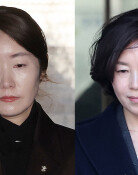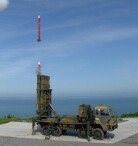Dissolution of the Cold War Structure on the Korean Peninsula after NK Nuke Resolution
Dissolution of the Cold War Structure on the Korean Peninsula after NK Nuke Resolution
Posted November. 24, 2004 22:58,
An authority of the U.S. State Department said yesterday that the six-party talks can be developed into a security cooperative of Northeast Asia after resolving the North Korean nuclear issue, and that the body can discuss ways to dissolve the cold war structure on the Korean Peninsula.
The authority said as aforementioned at a gathering with Korean correspondents at the National Press Center in Washington, and added, Its time for Pyongyang to return to the six-party talks and make the strategic decision (of nuclear renunciation).
He stated, With the nuclear renunciation declaration as the dividing ridge, if the North returns to the Non-Proliferation Treaty (NPT), we can more than simply realize the denuclearization of the Korean Peninsula and discuss ways to tear down the cold war structure on the peninsula.
Although the Roh administration discussed many times about the six-party talks in the context of a Northeast Asian security cooperative as a long-term vision, it is extraordinary for an authority of the State Department to comment on it right after President George W. Bushs re-election.
In particular, the authoritys remark yesterday received attention as it coincides with the Idea of Turning the Six-Party Talks into a Security Cooperative reported by the Japanese daily Nikkei on November 19. The newspaper reported, White House National Security Advisor Condoleeza Rice visited China in August and conveyed such opinion to the leader of the country.
The newspaper also stated that the U.S. suggested to China about concluding a multilateral peace convention to replace the 1953 agreement of armistice through this body.
A diplomatic source in Washington also pointed out that the U.S. East Asia strategy in the 21st century lies in the idea of forming a security cooperative.
The source said, Washington is concerned about which influence the unified Korea to be born will align its national interests to between the U.S. and China. The emergence of a pro-China unified Korea can bring about a situation in which the U.S. will have to redraw its Northeast Asia strategy.
In addition, the authority of the State Department stated, If there is progress, for example, the nuclear renunciation by the North, it can serve as a model to discuss issues including arms reduction of conventional weapons and the limitation on missile development among the six parties.
Also, the authority forecasted that various forms of bilateral talks will be possible during the six-party talks. He said, (Although negotiations cannot be made) Bilateral talks in the frame of the six-party talks regarding economic relationship, normalization of diplomatic relations, human rights, and terrorism can be made.
Meanwhile, the authority evaluated President Rohs speech made in Los Angeles, It was a good speech in that North Koreas nuclear weapons cannot be tolerated, and the nuclear issue should be settled diplomatically through the six-party talks.
Seung-Ryun Kim srkim@donga.com







